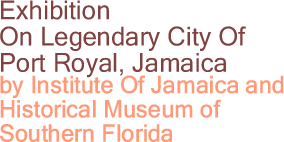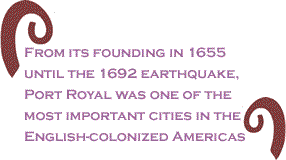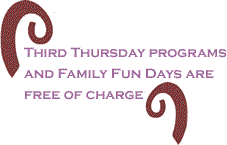
|
|||||||||||||||||||||
 |
|||||||||||||||||||||
 |
|
-

For the first time in the United States, the public will have an opportunity to view a large collection of rare artifacts from the famous Jamaican city of Port Royal, much of which sank under the sea in a devastating earthquake in 1692. Port Royal, Jamaica, an exhibition jointly organized by the Institute of Jamaica and the Historical Museum of Southern Florida, will be on display at the downtown Miami museum from February 16 through June 3, 2007. Once known as the “wickedest city on earth,” Port Royal has a past far richer than pirates’ treasures. For centuries, Port Royal has been a focal point of Caribbean and Atlantic history: a cosmopolitan port and center for the African slave trade during the 17th century, a major base of the British Royal Navy during the 18th and 19th centuries, and a maritime town and world-class heritage site today. “We are very honored to collaborate with Jamaica’s national museum on this ground-breaking project,” says Dr. Stephen Stuempfle, chief curator for the Historical Museum of Southern Florida. “The Historical Museum is committed to partnering with other institutions to explore how events in the Caribbean have shaped world history during the past several centuries.” From its founding in 1655 until the 1692 earthquake, Port Royal was one of the most important cities in the English-colonized Americas. Comparable in size to Boston, it was densely settled, graced with lavish homes and imposing forts, and extremely wealthy, due in part to government-sanctioned pirate raids of Spanish ships and ports. The city was also known for its abundance of shipwrights, blacksmiths, pewterers, silversmiths and other skilled craftsmen.
“To fully understand English colonial activity in the region it is important that we understand the history of Port Royal. These objects present a unique opportunity to examine this history,” says Wayne Modest, Director of Museums of History and Ethnography at the Institute of Jamaica. Museum visitors will be able to see over 150 unique artifacts illustrative of life in Port Royal, such as an intricately engraved tortoise-shell comb case, a red clay pipe associated with African craftsmen in the city, a pewter plate made by local pewterer Simon Benning, Chinese porcelain, German stoneware and Spanish silver coins. Many of these artifacts were recovered through underwater archaeology expeditions carried out since the 1950s. The Royal Navy era of Port Royal’s history will be portrayed through such items as a Spencer Browning & Rust telescope, pharmaceutical vials from the naval hospital, and a bust of Horatio Nelson, one of several British naval heroes who served in Port Royal during the 18th century. Rare maps, prints, books and manuscripts will accompany this wide-ranging collection of artifacts from the National Library of Jamaica, the University of Florida George A. Smathers Libraries and the Historical Museum of Southern Florida. Among the many treasures are John Taylor’s map of Port Royal, with perspective views of the city before the earthquake, and two illustrations of ships at Port Royal by the prominent 19th-century British artist Joseph Bartholomew Kidd.
The exhibition also will examine community life in Port Royal today through 25 stunning black and white photographs shot during the 1980s by Maria LaYacona, one of Jamaica’s leading photographers. In addition, video footage of efforts to research and preserve Port Royal’s heritage through underwater archaeology will be on display. A variety of educational programs will be presented in conjunction with Port Royal, Jamaica. On each Third Thursday evening from March to May, the Historical Museum will offer lectures and other programs related to Jamaican history and cultural traditions. Family Fun Days will take place every Saturday, beginning February 10, from 1 to 3 p.m., with hands-on activities for children. Third Thursday programs and Family Fun Days are free of charge. Port Royal, Jamaica is sponsored in part by the Jamaica Committee, Air Jamaica, the Jamaica Tourist Board and Jamaica Awareness. Additional support was received from the State of Fla., Dept. of State, Div. of Cultural Affairs, Fla. Arts Council & Div. of Historical Resources; the Miami-Dade County Dept. of Cultural Affairs, the Cultural Affairs Council; Miami-Dade County, the Mayor & the Miami-Dade County Board of County Commissioners; and the members of The Historical Museum of Southern Florida. Special thanks to Consulate General of Jamaica (Miami), Jampact, The Jamaican Diaspora, C.P. Ricardo Allicock, Marcia Bullock, Eddy Edwards, Marlon A. Hill, Cathy Kleinhans, Jacky Shepard, Vicki Silvera and Tina Spiro. For more information about the Port Royal, Jamaica exhibition, call the Historical Museum at 305.375.1492 or visit www.hmsf.org About The Institute of Jamaica The Institute of Jamaica was established in 1879 by Sir Anthony Musgrave, Governor at the time. Over the years the institution has developed into the most significant cultural, artistic and scientific organization in Jamaica. In 1978, the Institute of Jamaica Act of 1879 was repealed and its scope of activities expanded. The services provided by the Institute as far back as the nineteenth century are still integral to the cultural and academic life of the island. There are six Divisions of the Institute of Jamaica: The Natural History Division (formerly the Science Museum established 1891); The National Gallery of Jamaica (established as a portrait Gallery in 1892); The African Caribbean Institute of Jamaica/Jamaica Memory Bank (established in 1972); The Museum Division; and two Junior Centres (East Street and Portmore) established in 1941 and 1996 respectively. The Institute of Jamaica is located at 10-16 East Street in Downtown Kingston. About The Historical Museum of Southern Florida The Historical Museum of Southern Florida tells the stories of South Florida and the Caribbean. The museum promotes understanding of the past in order to inform the present and create a better quality of life. The Historical Museum hosts a permanent exhibition gallery and a special gallery with several changing exhibitions each year. In addition, the museum houses the Research Center, a non-circulating library and archives open to museum visitors, and The Indies Company, the museum’s store, which offers a unique array of Florida-themed books and gifts. The Historical Museum is located in downtown Miami in the Miami-Dade Cultural Center, across the street from Metrorail’s Government Center Station at 101 West Flagler Street, Miami, Florida 33130. Hours are Monday - Saturday 10 a.m. - 5 p.m., third Thursdays 10 a.m. - 9 p.m. and Sunday noon - 5 p.m. Admission for adults is $5, children (ages 6-12) is $2, and children under 6 are free. Saturday is free admission, and Sunday is by contribution. |
|
| Home | |
| February 15,
2007 Issue 217 |
||||||||||||||
|
||||||||||||||
| Printer Friendly Version in resizeable plain text format | ||||||||||||||
 |
||||||||||||||
|
||||||||||||||
 |
||||||||||||||
 |
||||||||||||||
 |
||||||||||||||
| |
||||||||||||||
| |
||||||||||||||





























